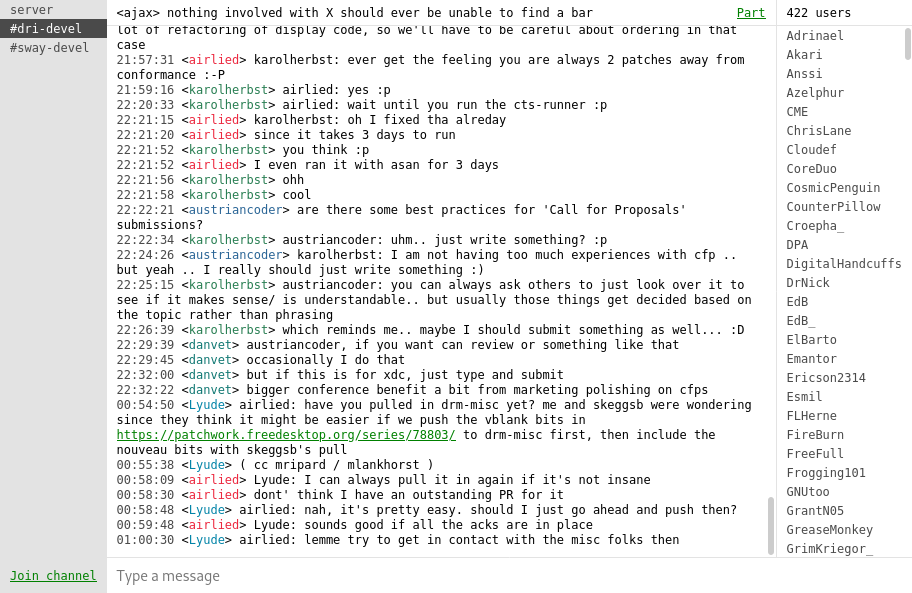| components | ||
| lib | ||
| .editorconfig | ||
| .gitignore | ||
| commands.js | ||
| index.html | ||
| keybindings.js | ||
| LICENSE | ||
| manifest.json | ||
| package-lock.json | ||
| package.json | ||
| README.md | ||
| state.js | ||
| store.js | ||
| style.css | ||
gamja
A simple IRC web client.
Usage
Requires an IRC WebSocket server.
First install dependencies:
npm install --production
soju
Add a WebSocket listener to soju, e.g. listen wss://127.0.0.1:8080.
Configure your reverse proxy to serve gamja files and proxy /socket to soju.
webircgateway
Setup webircgateway to serve gamja files:
[fileserving]
enabled = true
webroot = /path/to/gamja
Then connect to webircgateway and append ?server=/webirc/websocket/ to the
URL.
nginx
If you use nginx as a reverse HTTP proxy, make sure to bump the default read timeout to a value higher than the IRC server PING interval. Example:
location /socket {
proxy_pass http://127.0.0.1:8080;
proxy_read_timeout 600s;
proxy_http_version 1.1;
proxy_set_header Upgrade $http_upgrade;
proxy_set_header Connection "Upgrade";
proxy_set_header X-Forwarded-For $remote_addr;
proxy_set_header X-Forwarded-Proto $scheme;
}
If you are unable to configure the proxy timeout accordingly, you can set the
server.ping option in config.json to an interval, in seconds, between which
gamja will send opportunistic pings.
Development server
Start your IRC WebSocket server, e.g. on port 8080. Then run:
npm install
npm start
This will start a development HTTP server for gamja. Connect to it and append
?server=ws://localhost:8080 to the URL.
Query parameters
gamja settings can be overridden using URL query parameters:
server: path or URL to the WebSocket servernick: nicknamechannels: comma-separated list of channels to join (#needs to be escaped)
Alternatively, the channels can be set with the URL fragment (ie, by just appending the channel name to the gamja URL).
Configuration file
gamja default settings can be set using a config.json file at the root:
{
// IRC server settings.
"server": {
// WebSocket URL or path to connect to (string).
"url": "wss://irc.example.org",
// Channel(s) to auto-join (string or array of strings).
"autojoin": "#gamja",
// Controls how the password UI is presented to the user. Set to
// "mandatory" to require a password, "optional" to accept one but not
// require it, and "disabled" to never ask for a password. Defaults to
// "optional".
"auth": "optional",
// Don't display the login UI, immediately connect to the server
// (boolean).
"autoconnect": true,
// Interval in seconds to send PING commands (number). Set to 0 to
// disable. Enabling PINGs can have an impact on client power usage and
// should only be enabled if necessary.
"ping": 60
}
}
Contributing
Send patches on the mailing list, report bugs on the issue tracker. Discuss in #soju on Libera Chat.
License
AGPLv3, see LICENSE.
Copyright (C) 2020 The gamja Contributors
